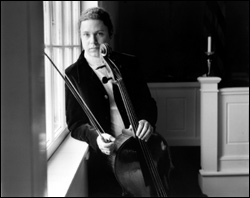There are all kinds of stupid ways to counteract the lowering profile of classical music in our culture. You could, for example—if you were Bond, the British all-babe string quartet who plays kitsch-rock instrumentals, or Sony, who have recently signed to their classical division a couple mainstream pop singer-songwriters—try to spark interest by not presenting classical music at all.
Cellist Matt Haimovitz was prescient enough to see that a career as a touring soloist, playing Saint-Saëns in South Bend and Lalo in Lexington, or even Beethoven in Berlin, was neither going to be particularly rewarding artistically nor very helpful in stemming audience shrinkage. So he’s playing in clubs like New York City’s CBGB, or our own Tractor Tavern, rather than the usual churches or recital halls. Haimovitz has been gambling that smaller, informal venues, which promote intimacy between musicians and their serious—earnest, not somber —fans, would work just as well for classical music as they do for pop, jazz, folk, whatever. And he’s been right—he’s packed the Tractor three times, with two programs of Bach suites and one of contemporary works.
Haimovitz also left Deutsche Grammophon to start his own label, Oxingale, freeing him to pursue his own eclectic interests. The new Please Welcome . . . Matt Haimovitz is a smorgasbord moving from serious—somber and earnest—repertory like Bach’s Suite No. 2, to virtuoso ear candy by Chopin and Paganini, to three edgy new pieces (the latter two of which he’s played at the Tractor). Tod Machover’s “Begin Again Again” is written for “hypercello,” live sounds processed and played back in real time; Haimovitz’s mercurial solo line careens around emitting a trippy, sparkling halo of electronic effects. Toby Twining’s microtonal “9:11 Blues” keens and shrieks with a chilling intensity. There’s nothing stuntlike about Haimovitz’s signature piece, either. His re-creation of Jimi Hendrix’s deconstruction of the national anthem is neither a joke nor classical-but-hip posturing. Instead, Haimovitz makes something gripping and angry out of it, matching all of Hendrix’s sonic aggression acoustically.
Another young virtuoso is taking a very different career path—Deutsche Grammophon’s strategy with Chinese pianist Lang Lang is good old-fashioned star making, establishing him as a mainstream classical celebrity à la Heifetz, Bernstein, or Pavarotti. A live recording of Lang’s November 2003 Carnegie Hall recital is getting a lavish launch: a two–CD set, a glossy press kit full of orgasmic quotes, a world tour. (Contrast Haimovitz, who, even after Oxingale signed a distribution agreement with Artemis Classics, still schlepps around boxes of his CDs to sell at gigs.) The 21-year-old Lang’s even being marketed as a heartthrob.
Each season releases a flock of classical debutants, but none recently has roused as much audience excitement as Lang. The fiery exuberance of his playing, the over-the-top thrill ride he makes out of a piece like Liszt’s Fantasy on Mozart’s opera Don Giovanni, tries some critics’ patience, something appearances on The Tonight Show and in Teen People haven’t helped. Lang offers pyrotechnic double octaves, frighteningly flawless fingerwork, and bottom-of-the-keyboard thunder with the best of them, but his real gift is his way with a tune—the eloquently unmannered, subtly shaped, spontaneously flowing lyricism he brings to the Chopin Nocturne (Op. 27, No. 2) on his Carnegie disc, or the slow movement of Haydn’s Sonata No. 50.
But the fast movements of the Haydn are a little brittle and skittish, substituting mere idiosyncrasy for heartfelt wit—and in Haydn, wit is as capable of profundity and expressiveness as any emotion. And Lang’s Liszt performance lacks a sense of what Don Giovanni meant to the composer and his early-romantic contemporaries: the sublimity, grandeur, and terror that Liszt strove to bring out in his homage to the greatest opera yet written. Both Lang’s strong and weak points come out in Liszt’s “Liebestraum,” as the eloquence veers into self-indulgence just when the music gets showy.
For a Carnegie Hall audience, Lang’s program, which includes music from his homeland, is as daring in its way as Haimovitz’s. Tan Dun’s Debussy-meets-socialist-realism “Eight Memories in Watercolor” are tasty, and for an encore Lang brings out his er-hu-playing father for a duet. And to be fair, Haimovitz’s Bach seems a bit overwrought, too (this is dance music, after all, not Mahler), and the CD’s liner notes are really no soberer than any of the gush in Lang’s press kit. But both share an ability to connect with listeners, especially novice listeners, and a heartening, enthusiastic investment in the future of the art form that makes melodramatic doomsday think pieces on “The Death of Classical Music™” even harder to read without eye rolling.
Lang Lang will play Chopin’s Concerto No. 1 with the Seattle Symphony this weekend; call 206-215-4747 for tickets.







